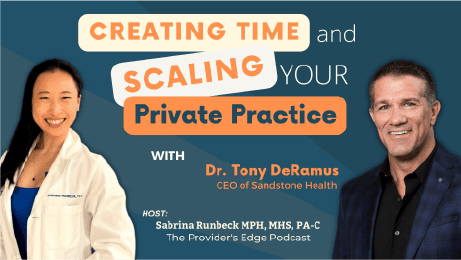
6 Ways To Maximize Your Time
According to Your Values
Private practice owners and providers, do you feel out of alignment in a certain area of your life? Or do you feel like you are trying to please everyone else while running yourself ragged in the process? Time to dial things back and start spending your time on what you value most in life. Scheduling your life according to what you value leaves you filled with purpose. There are seven core areas that you should be scheduled into your life - physical, financial, mental, spiritual, social, vocation, and family. How much time you spend on each category lies in what you value most in life. No category should also be neglected, or other areas will falter too. If you feel like it’s time to start living more authentically within your values and spending time on what really matters in life, then please make sure you tune in to the Provider’s Edge podcast this week, when host Sabrina Runbeck interviews Emmanuel Anthony, a human behavior specialist, research writer, consultant, and teacher. You’ll learn how to purposefully make time for what matters most to you by identifying your values in life and intentionally scheduling them each day or week. Join us In this podcast, I interviewed Emmanuel Anthony, a human behavior specialist, research writer, consultant, teacher, and director of Quantum Equilibrium. Emmanuel Anthony has worked with thousands of clients to guide them to bring about the changes they want in all areas of their lives using The Demartini Method. In today's episode, Emmanuel provides 6 ways you can live more authentically according to your values, and how to schedule those values into your life. Do you want to take your healthcare career to the next level? Find out 6 ways to help you find time for what matters most and how to live by your values by listening and subscribing to our episode now!Your success is just one step ahead, Just tap on the link below to listen to the full podcast to beat your competition…
Listen anywhere you get your podcastin' on.
Live Interview

Show Summary
Healthcare is a highly stressful field of work with a 30% to 40% turnover rate, per a University of California study.
Human behavior specialist, consultant, researcher, inspirational speaker, and writer Emmanuel Anthony, our guest for the day, believes that healthcare work isn’t high-stress per se. Workers bring their stress to their work. For every person that’s stressed, somebody else is managing their perceptions, health, wellness, and well-being in the healthcare industry really well.
Anthony arrives at this conclusion based on a decade of working with thousands of clients globally. He’s provided 1:1 assistance to people to figure out their mission on this planet, overcome common mental disorders, and accelerate their growth and mastery in all areas of life.
Levels of Stress
Each of us experiences stress differently. Consequently, the levels of stress we experience also vary greatly. Not everyone who’s working in a high-stress environment is stressed out.
Motivated, dedicated, and inspired individuals who love their work find their jobs more fulfilling and less stressful, even if they’re at the top of their field, like a CEO. On the other hand, if you’re working at a job you’re not suited to, you’ll find even the most menial tasks stressful to perform.
The key to decoding stress levels is understanding each person's value system. Your values and work should be in congruence to drive down stress levels. If your work is not in harmony with your value system, your stress levels increase, leading to physiological and psychological symptoms. In order to fix this anomaly, you need to begin by figuring out your value system.
6 Tips to Organize Your Work Life and Manage Stress
Transitioning into a new role or workspace that aligns with your values is a slow process that requires small steps. Quitting cold turkey and starting from scratch without any preparation is not the way to go about it. Here are a few tips for organizing your work and life around your value system while managing stress with ease.
1. Find Your Calling
In order to find your calling, you must first understand and prioritize your value system. Emmanuel recommends Dr. John D. Martini’s 13 questions evaluation process. Answer the 13 questions as authentically as possible to know what you value most in life. Each of us operates with a different set of values. Bear in mind that your answers to these questions shouldn’t be colored by your religious, social, or political beliefs. Be as authentic as possible to get a useful evaluation.
You can group the answers to these questions into meaningful areas. Start organizing your work, life, and calendar based on these groupings. Figure out a profession, a career, or a field of work that prioritizes the values that matter the most to you. Now you can begin switching to a new line of work that aligns with your values gradually.
2. Organize Your Calendar Based on Your Value System
Divide your daily and weekly calendar into time clusters, with the biggest cluster going to the most important values. Let’s say health and fitness are important to you; factor in time on your calendar for daily/weekly exercise routines, meal-prep time, sleep schedule, hydration-time alarms, and lunch breaks.
You can similarly start filling in your calendar for other activities like socializing, reading, family time, hobby time, and more based on values that matter to you.
This helps you create a proper daily structure for your life and provides mini-goals to achieve every day. All you need to do is hit those goals for the day to be productive, get things done, and keep stress away.
Emmanuel’s handy tip to create and organize a simple timetable:Take all seven areas of your life—physical, financial, mental, spiritual, social, vocation, and family. Now take a calendar and allocate time for essential life functions like sleep, work hours, and other unskippable tasks. Balance the time left between each of your value system areas. The remaining time allocation should cover all seven areas to reduce stress levels. Needless to say, you should prioritize the areas that matter the most to you.
3. Stay on Track
You have created calendars and timetables before. How do you make sure you stick with this one? Here are two easy tips to stay on track:
1. Make Your Tasks Non-Negotiable:
Make a few select tasks on your calendar non-negotiable. Mark the tasks, especially the ones you tend to skip out on, as non-negotiable, implying that you must perform the task within the allocated time to avoid stress and stay productive. Getting in a few daily tasks will inspire you to stay on track and motivate you to follow the calendar more diligently.
2. Have Some Wiggle Room:
Do not have an overbooked calendar with no free time. Allow yourself free time every day, especially on weekends. Do not overstretch yourself by penciling in a task for every hour of the day.
4. Learn to Delegate
Not everything on your calendar is going to be fulfilling. Doing your taxes certainly elicits no joy, but it’s unavoidable. Similarly, you must hit other tasks or goals even if you find the work miserable and struggle to be good at. This is where delegation comes in.Delegate tasks you aren’t good at to others who excel at them. There are professional accountants to take care of finances, trainers to figure out your exercise regime, and so on. Focus on things you love doing and delegate tasks you aren’t comfortable with to others. It’s an excellent way of achieving all your goals, even in areas your value system doesn’t prioritize.
5. Prioritize Yourself
Your calendar is your guide to achieving your productivity goals—both short-term and long-term, managing stress, and living a more fulfilling life. This means your calendar and your activities take priority over everything and everyone. You are the VIP of your world; treat yourself like one. This does not mean you ignore your social life, clients, colleagues, family, and acquaintances. Social activities and people time should already be factored into your calendar—helping you give them complete and total attention when you’re with them, without the distraction of work or other activities. It enables you to be more present in the moment, pay more attention to the people and places around you, and be a more substantial presence in their lives.When your stress levels are down and you feel inspired and content, you’ll be in a better position to help others. By prioritizing your goals, you’re helping yourself first to be able to help others. This also implies that you may not be able to accommodate impromptu social activities like a drink at a pub with friends on a Monday afternoon. But that’s a choice you need to get comfortable with. You’re giving priority to a non-negotiable task over a random social call. However, it’s not a rule written in stone, and you can be more flexible in your approach if it’s a rare social call like accommodating an overseas friend’s brief visit. You can push stuff around on your calendar to prioritize a different focus area for a while.
6. Find Inspiration for Difficult Tasks
All tasks are not created equal. Some inspire joy and fulfillment, while others just drag on. The key to turning these tasks around is to find inspiration in areas that you find less inspiring. Instead of dreading and prolonging the task, find a way to tackle it efficiently. Also, avoid piling up challenging tasks. Because whatever you run away from, you run into. Set aside time on the calendar to deal with uninspiring tasks, then finish them on time. Before you know it, you’ll be checking them off the to-do list without stressing about them all the time.
Listen to the podcast to learn more about aligning your work with your value system, organizing your life, finding inspiration, and stress management not included in this post. This article is a summary of my conversation with Emmanuel Anthony on episode #22 of the Provider's Edge Podcast. Subscribe ? and listen ?to the entire discussion now❗ We are here to support you and help you elevate your success as a healthcare leader and practice owner.Love to hear from you, send me a voice message here: SabrinaRunbeck.com/Connect P.S. - Link to University of California Study - https://www.ncbi.nlm.nih.gov/pmc/articles/PMC6342603/
Recommended Podcast Episodes
Ep 55
Embracing Food Identify:Healing modern-day gut issues through traditional healing foods with Dr Sara
Be a guest on our show
The Provider's Edge show is always looking to feature healthcare change-makers and celebrate the work they are doing to improve healthcare.
Together, we can encourage other healthcare entrepreneurs and startup founders to up-level their businesses.If you or someone you know could be a good fit as a guest on the show, please click on the bottom below to apply as a speaker.
Healthcare Entrepreneurs!
I can help you gain visibility and credibility in the right circles so you can accelerate your mission and profitability!After overcoming burnout working in surgery, I went back to my roots in neuroscience and public health. I learned the importance of building key human relationships with my team throughout our organization.While helping healthcare executives and entrepreneurs to get out of the day-to-day operation of their practice, I realized I needed more visibility and more connections to reach my ideal clients.Once I set out to be highly visible in the right circles, I was able to leverage my network of strategic partners to convert clients 5x higher than any other marketing channel I had tried previously.Now I help healthcare change-makers to accelerate their impact and increase profitability by gaining visibility and credibility with the right strategic partners.My clients no longer worry about where their next client is coming from, the need to plan additional budget for ads spending, or losing the ability to connect with others because their social media account is shut down.If you want to share your social mission with the world and gain pivotal supporters that become loyal clients... then you are in the right place, with the right consultant who is also a recovered clinician.




